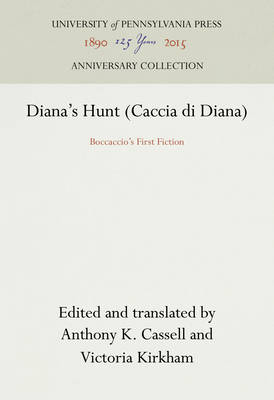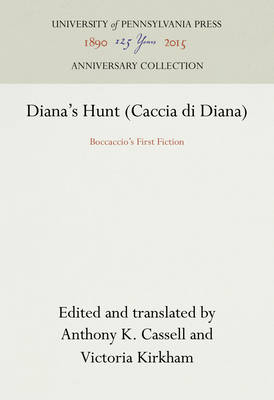
- Retrait gratuit dans votre magasin Club
- 7.000.000 titres dans notre catalogue
- Payer en toute sécurité
- Toujours un magasin près de chez vous
- Retrait gratuit dans votre magasin Club
- 7.000.0000 titres dans notre catalogue
- Payer en toute sécurité
- Toujours un magasin près de chez vous
Diana's Hunt (Caccia Di Diana)
Boccaccio's First Fiction
136,95 €
+ 273 points
Description
Giovanni Boccaccio is one of the most influential writers in the Western tradition, yet his first literary work, "Diana's Hunt," has never been translated into English, and the Italian text has long been out of print. Anthony Cassell and Victoria Kirkham redeem Boccaccio's early effort in this dual-language edition, with an extensive introduction and commentary, that goes far beyond assuring its accessibility.
The plot of "Diana's Hunt" is simple enough: the narrator observes the goddess Diana convening a band of Neapolitan court ladies to hunt in a wood. After slaying an impressive number of beasts, the huntresses are incited to rebellion against Diana by the fairest of their number. They invoke the goddess Venus, who transforms the beasts into young men ready to be faithful to her. As a final twist, the narrator himself, who we now learn was actually a stag all along, undergoes a similar transformation and is offered to the fairest lady. Cassell and Kirkham have edited the Italian text of "La Caccia di Diana," drawing from the six extant manuscripts of the original work. Their critical interpretation of the poem redefines the ground on which we evaluate the merits of "Diana's Hunt" and points to ways in which it looks forward to Boccaccio's later work. The poem emerges as an allegory of the struggle in the soul before Christian baptism and entrance into the active life of virtue. This theme will be central in the early fictions, such as the Filocolo and Ameto, and will be parodied and reversed in the later Elegy of Madonna Fiammetta and Corbaccio. The editors offer a readable translation, extensive notes, and a glossary of female historical characters that will prove invaluable to students and scholars of medieval and Renaissance literature, women's studies, and art history.Spécifications
Parties prenantes
- Traducteur(s):
- Editeur:
Contenu
- Nombre de pages :
- 288
- Langue:
- Anglais
- Collection :
Caractéristiques
- EAN:
- 9780812282191
- Date de parution :
- 01-03-91
- Format:
- Livre relié
- Format numérique:
- Genaaid
- Dimensions :
- 156 mm x 234 mm
- Poids :
- 562 g

Les avis
Nous publions uniquement les avis qui respectent les conditions requises. Consultez nos conditions pour les avis.





